
Bolstering careers: a year in genomics learning and training
Accelerating discovery science | Building global communities of practice | Transforming careers
It has been a pivotal year for our learning and training agenda at Wellcome Connecting Science (WCS). Through our global activities and collaborations, we have engaged with almost 25,000 scientists worldwide; connecting them with the latest genomics research, tools and techniques, to enhance careers and support equitable implementation of genomics medicine.
Key to our overall aim is the delivery of learning and training opportunities, in accessible formats, to address global and regional needs, and bridge knowledge gaps; for researchers, clinicians, public health practitioners and healthcare professionals, working in genomic science, surveillance or clinical practice.
This year, the breadth of our projects and events has been met with an overwhelming response; highlighting the global gap in advanced genomics training, and the critical importance of addressing this through the implementation of effective capacity building.
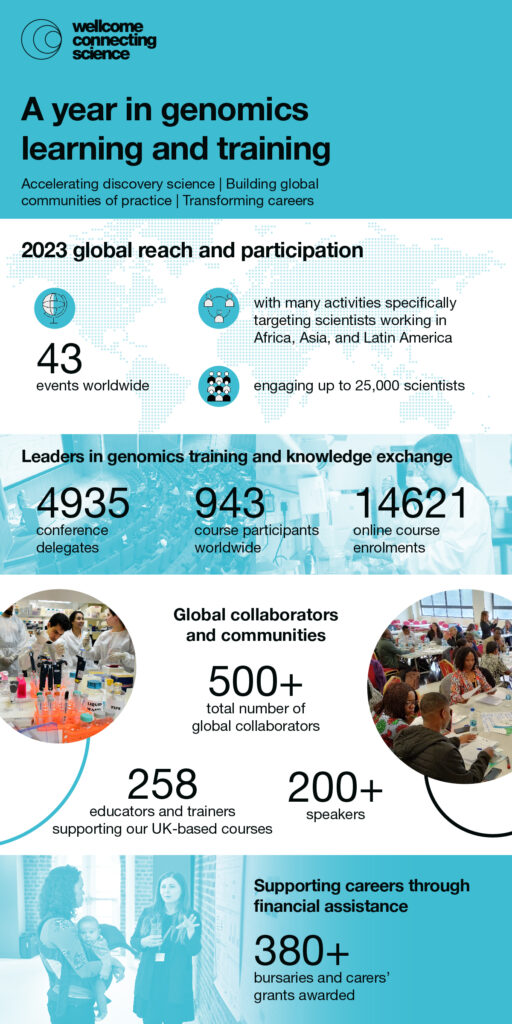
Our programme is not bound by geographical location or organisational restraints, enabling us to respond to emerging global health priorities and challenges through flexible and accessible education and training initiatives. Through established global partnerships, we can scale up existing investment to accelerate training or bridge knowledge gaps, where capacity in specific aspects of genomics is required the most.
As they say, the numbers don’t lie. We’re always oversubscribed for our events, demonstrating a demand for the varied learning and training activities we offer.
Michelle Bishop, Associate Director, Learning and Training, Wellcome Connecting Science
Global collaboration: connecting scientists with expertise
We have worked collaboratively with over 500 scientific and clinical experts from a range of global institutions and associations, as well as leading subject specialists from the Wellcome Sanger Institute, to develop a sustainable model for upskilling global communities in genomics.
On our global training programme, placing regional healthcare priorities, training needs, and datasets at the centre of our activities, has emphasised the value of science from underserved regions to address global human health challenges.
Enabling scientists based in Africa, Asia, and Latin America to connect with peers and expertise, contributes to building a framework to scale up science from these regions, into relevant solutions for some of the world’s most urgent public health challenges.
Pandemic lessons
The recent pandemic shone a spotlight on the urgent need to build greater global capacity in pathogen genomics, working with underserved regions who have a wealth of experience in managing infectious disease surveillance.
Our collaboration with COG-UK sought to deliver accessible training in pathogen genomics, through a series of massive open online courses (MOOCs), as part of our COG-Train initiative.

In May, this culminated into a set of comprehensive and freely accessible course materials, taken from our COG-Train MOOCs and train-the-trainer initiatives, now available on GitHub.
Building a network of skilled genomics trainers in the UK
We are also engaged in a concerted effort to expand genomics expertise across the UK; aiming to tackle imbalances, either in access to local training or securing funding to travel to an available course.
Together with partners we have delivered the T3 Connect, project, with the main output a series of ‘How to design and deliver pathogen genomics training for health and research professionals’ workshops, designed to teach “best practice” methods for building successful genomics-focused training programmes.
Focused on the dissemination of knowledge and skills in genomic pathogen surveillance, our first workshop was led by experts in the field, as well as specialists in pedagogical approaches. This combination of expertise and experience uniquely integrated education and communication with genomics and pathogen data science, building a course framework around the surveillance workflow and outbreak investigation. Subsequently, T3 Connect course alumni have returned as trainers on further iterations of the workshop; allowing past participants to put their newly acquired knowledge and skills into action.
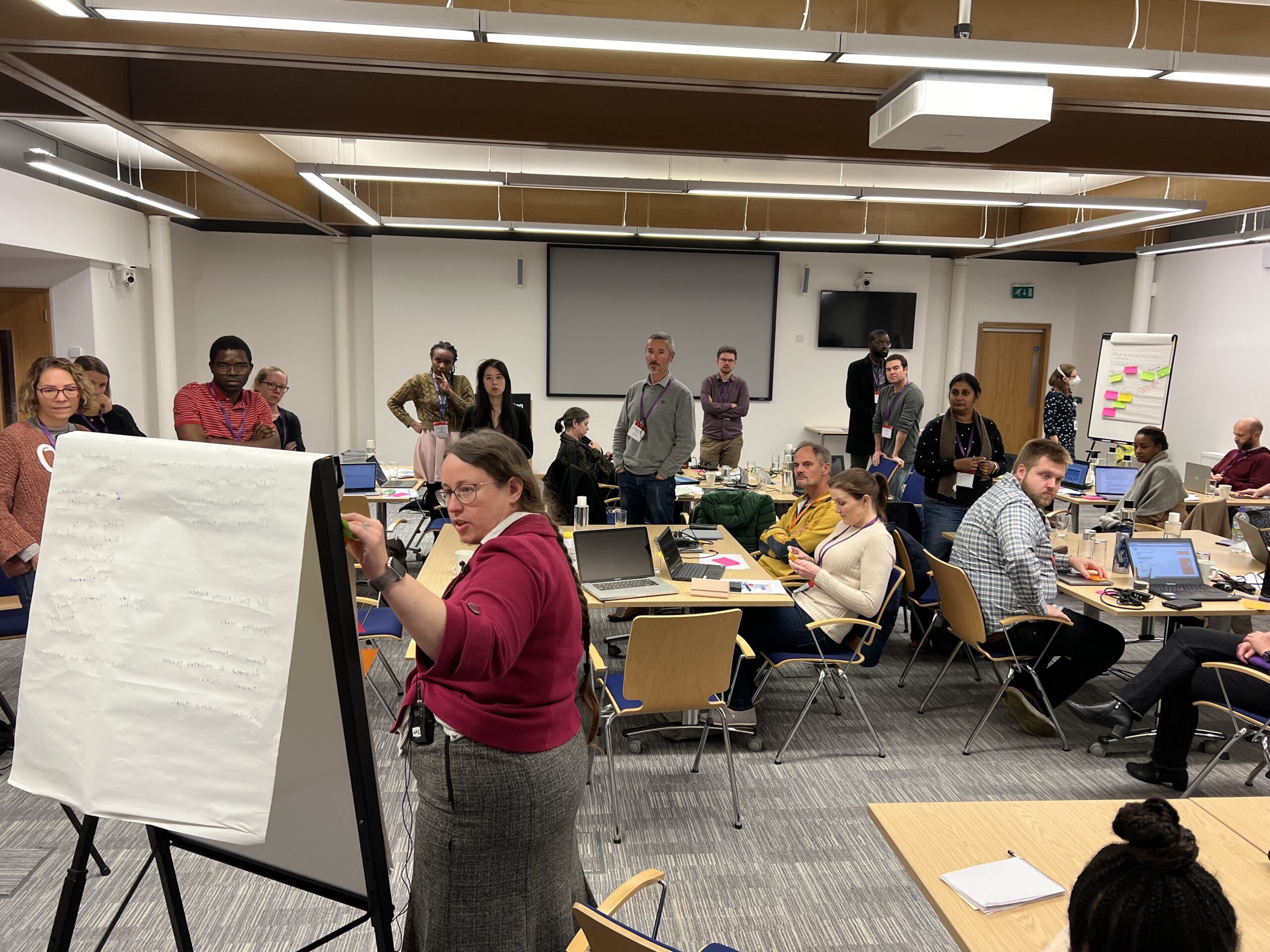
Conferences: leaders in developing and delivering research meetings
Our work developing research conferences to foster knowledge exchange, network building and collaboration, underpins our strategic objective to accelerate global research in genomics. Providing scientists from all backgrounds with a welcoming and supportive environment to share their latest research insights, and grow a professional profile to support career development.
From mid-2024, our conference attendees will have access to a conference app, through the introduction of our new registration system, provided by EventsAir. All conference information will be accessible on your mobile phone, throughout the event.
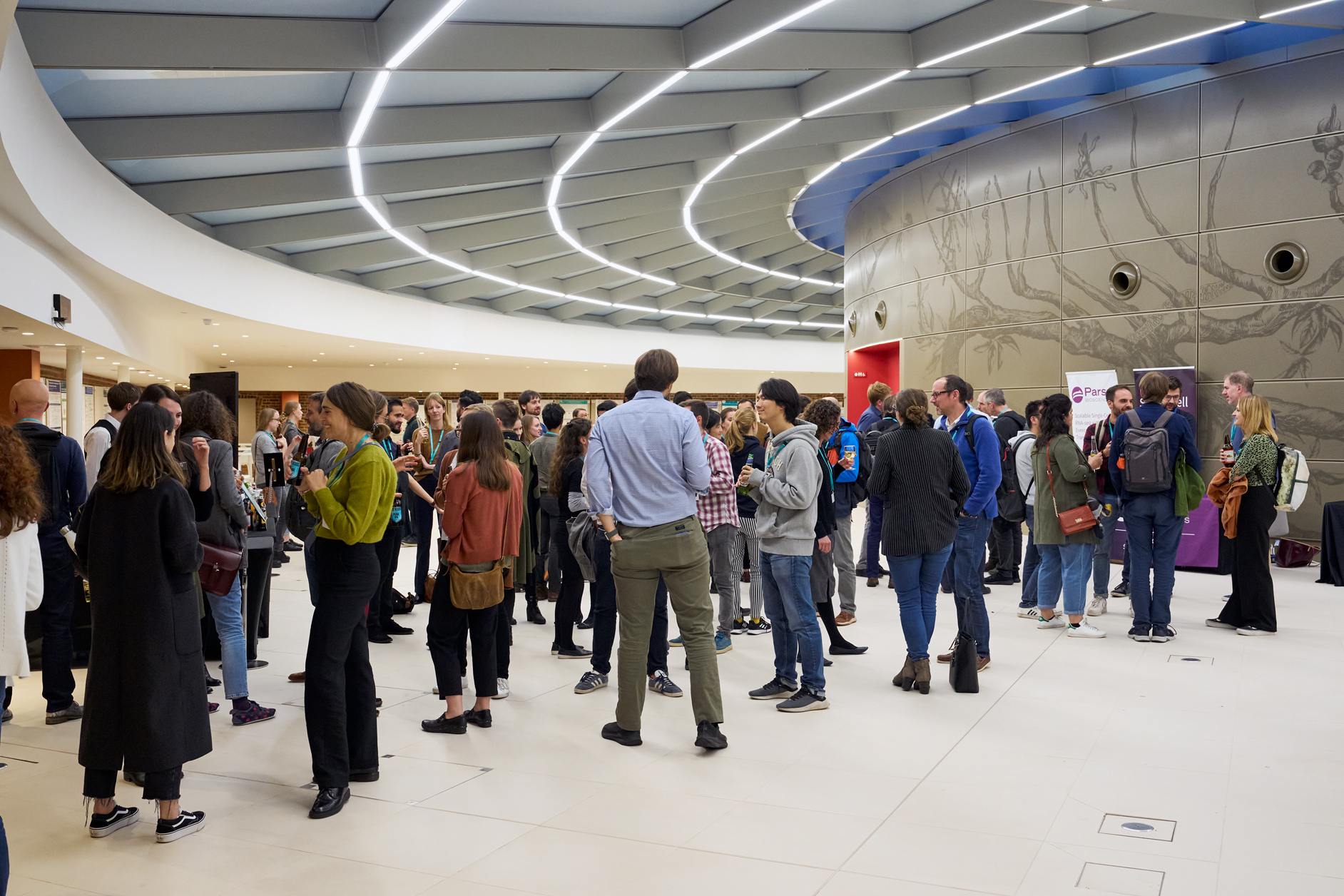
Tacking inequalities to develop careers
Whether we are providing accessible platforms for learning and training, supporting genomics data diversity, or facilitating the dissemination of research insights from underserved regions, we are committed to tacking structural inequalities in all aspects of genomics.
Removing financial barriers
We actively support members of our communities facing financial barriers to participating in research meetings or training courses, through our bursary scheme. This year we have awarded over 350 bursaries, covering up to 50% of the course or conference fee, and we have provided additional support for caregivers in the form of carers’ grants.
Addressing equity in microbiome research
In July, we played host to the first Microbiome Retreat, at our Hinxton Hall Conference Centre, on the Wellcome Genome Campus, UK. Drawing on research from our Wellcome Sanger Institute colleagues, in the Host-Microbiota Interactions lab, we co-organised this workshop with partners in Kenya, Pakistan and the USA, to strengthen microbiome research in underrepresented regions.
The event brought together 40 leaders from research institutions, funding agencies and policy, from over 20 different countries. Discussion covered how to accelerate microbiome research to improve the health of children in Asian, Latin American and African countries.
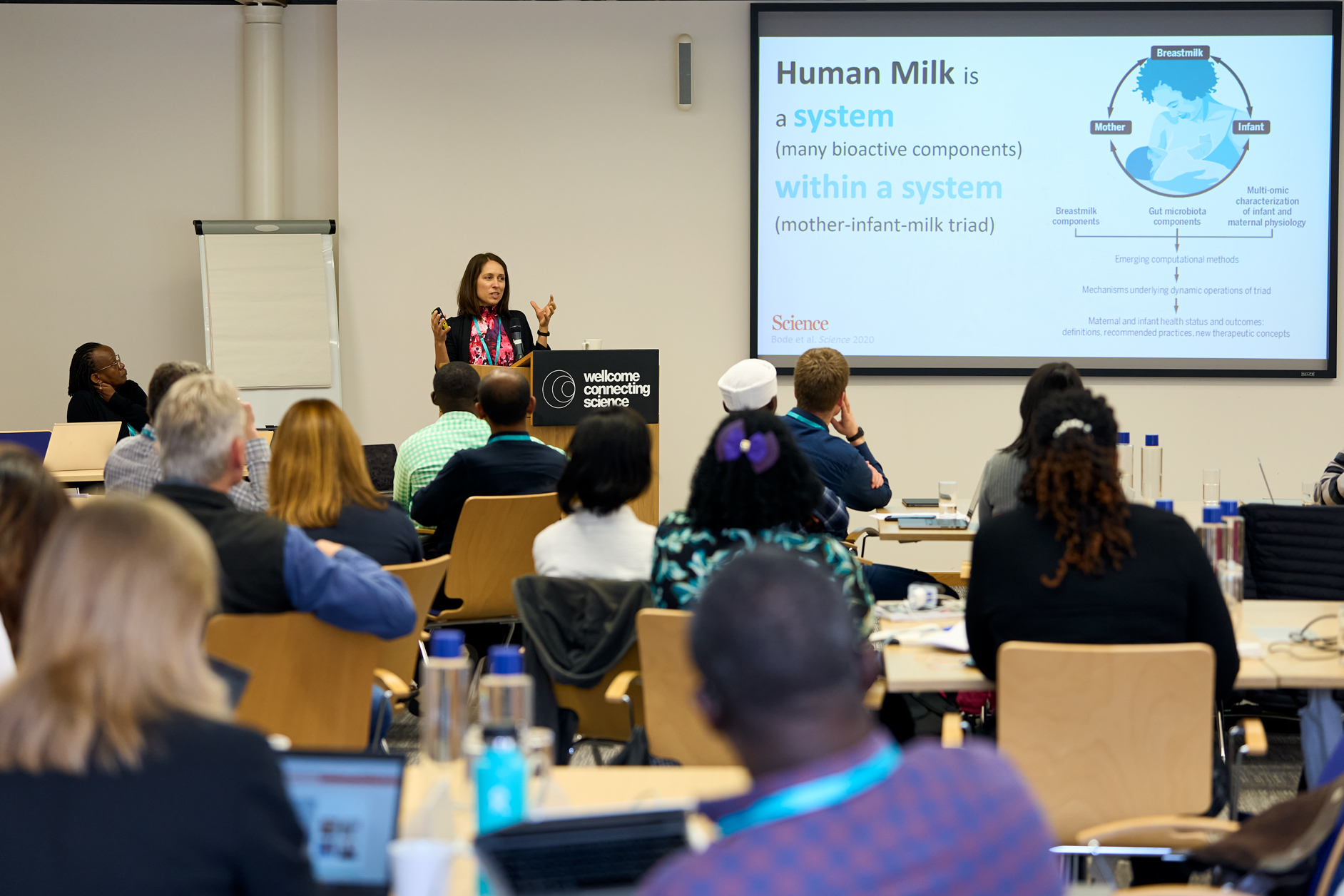
Data diversity
In September, we delivered our first workshop focusing on the importance of equity in genomics research. The discussion was led by scientists working in Latin America and Africa, and debated best practice approaches to tackling the unequal representation in genomics data in those regions.
From the impact on population and global health to methods for fostering inclusive studies, participants opened the dialogue on these complex issues, and a full report on the outcomes of the discussions will be shared with the broader microbiome research community.
In the meantime, participants remain in contact through the Slack channel set up during the retreat to support continued sharing and collaboration.
Communities of practice
Essential to our endeavor to upskill our global scientific communities, is the development of communities of practice; fostering continued learning, networking and collaboration beyond a single training course.
This year, we delivered a Single Cell Genomics course in Brazil, alongside our host organisation, the Instituto Nacional de Câncer (INCA).
Working with specialists in biology and bioinformatics, from Latin America, North America and the UK, participants delved into a combination of laboratory and computational sessions – a first of its kind to be delivered in this region.
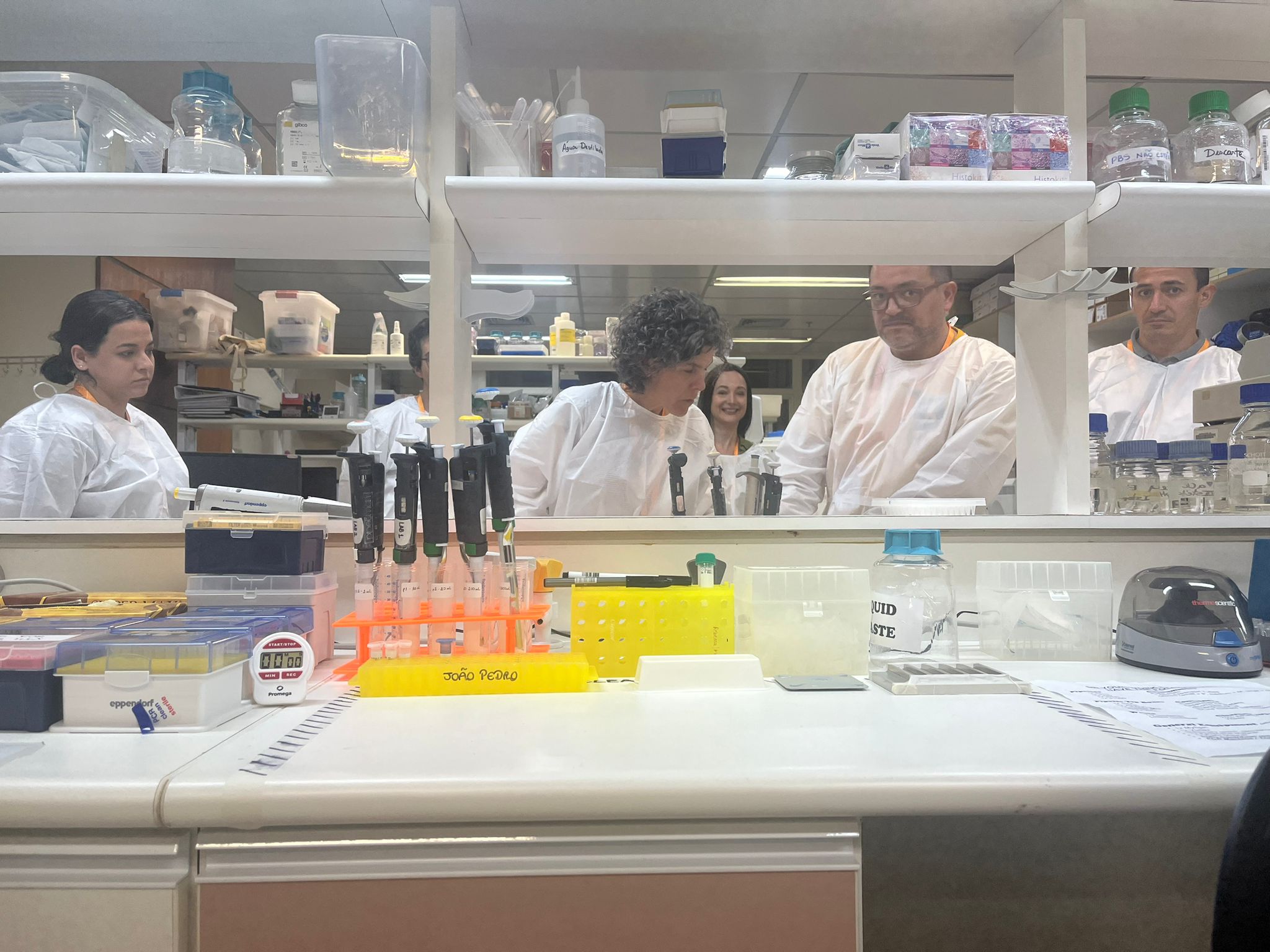
Single Cell Rio 2023: The first hands-on wet & dry-lab single cell course in Latin America, in my home country too! This experience is up there with the most rewarding of my career so far. Still in awe I was asked co-lead the lab practicals!
Anita Scoones, Earlham Institute, UK and Single Cell Genomics 2023 instructor
After this integrated learning experience, participants have kept in touch through scheduled webinars, facilitated by the Connecting Science Learning and Training team, as well as informal networks developed throughout the course. This group will be the first members of a Latin America Single Cell Genomics community of practice, aiming to accelerate capacity building within the region through ongoing training and nurture of new collaborations.
Continued development of our communities of practice model will evolve over the next two years. We already have existing networks with: SAGESA, an African AMR Genomics peer network; A network of trainers, an outcome of the T3 Connect project; Bioinformatics Trainer Community, established through the Education Summit Consortium in collaboration with H3Abionet; and the COG-Train community, where participants from Africa, Asia and Latin America can join interactive webinars using the Gather Town platform to share knowledge around pathogen genomics, training opportunities and best practice to support capacity building.
What next...
Looking ahead to 2024 and beyond, our learning and training programme will continue to offer a broad range of activities, across the globe, focusing on many aspects of genomic science, surveillance and clinical implementation.
In addition, we are expanding our efforts across three key areas that collectively help to address global health priorities, and strengthen our understanding of human health, the effect of human interaction with the environment, and the impact of cutting-edge genomics tools and technologies.
A focus on antimicrobial resistance (AMR):
In March 2024, our Antimicrobial Resistance in Bacterial Pathogens course will be hosted in Johannesburg, South Africa, with our partner, the National Institute for Communicable Diseases (NICD). A first for our global training programme, the course will conclude with a two-day symposium involving course participants, as well as other scientists working in AMR across Africa. This will also be the first in-person event for the SAGESA network – a key achievement for an initiative that started during the pandemic.
Coinciding with our activities in Africa, our fourth Antimicrobial Resistance – Genomes, Big Data and Emerging Technologies conference, will take place in the UK (13-15 March 2024). Through technology, we will be able to have our AMR Africa course participants join the conference for different sessions, linking the two events.
Working with our new partner ACORN, a Clinically Orientated Antimicrobial Resistance Network (a Wellcome funded human health clinical AMR surveillance project), we will develop a bespoke training programme for delivery through ACORN centres; providing participants with hands-on training in how to manage and analyse the large amounts of genomic data they generate. Through tailored learning, participants will develop the skills to use this valuable data to interpret more comprehensive insights, to improve clinical decisions and AMR surveillance.
A focus on single cell genomics:
Building on the success of the first Single Cell Genomics course, held in Brazil, our second course will return to the region in 2024. Our aim is to increase the number of single cell genomic scientists in Latin America, and expand on the community of practice established in 2023.
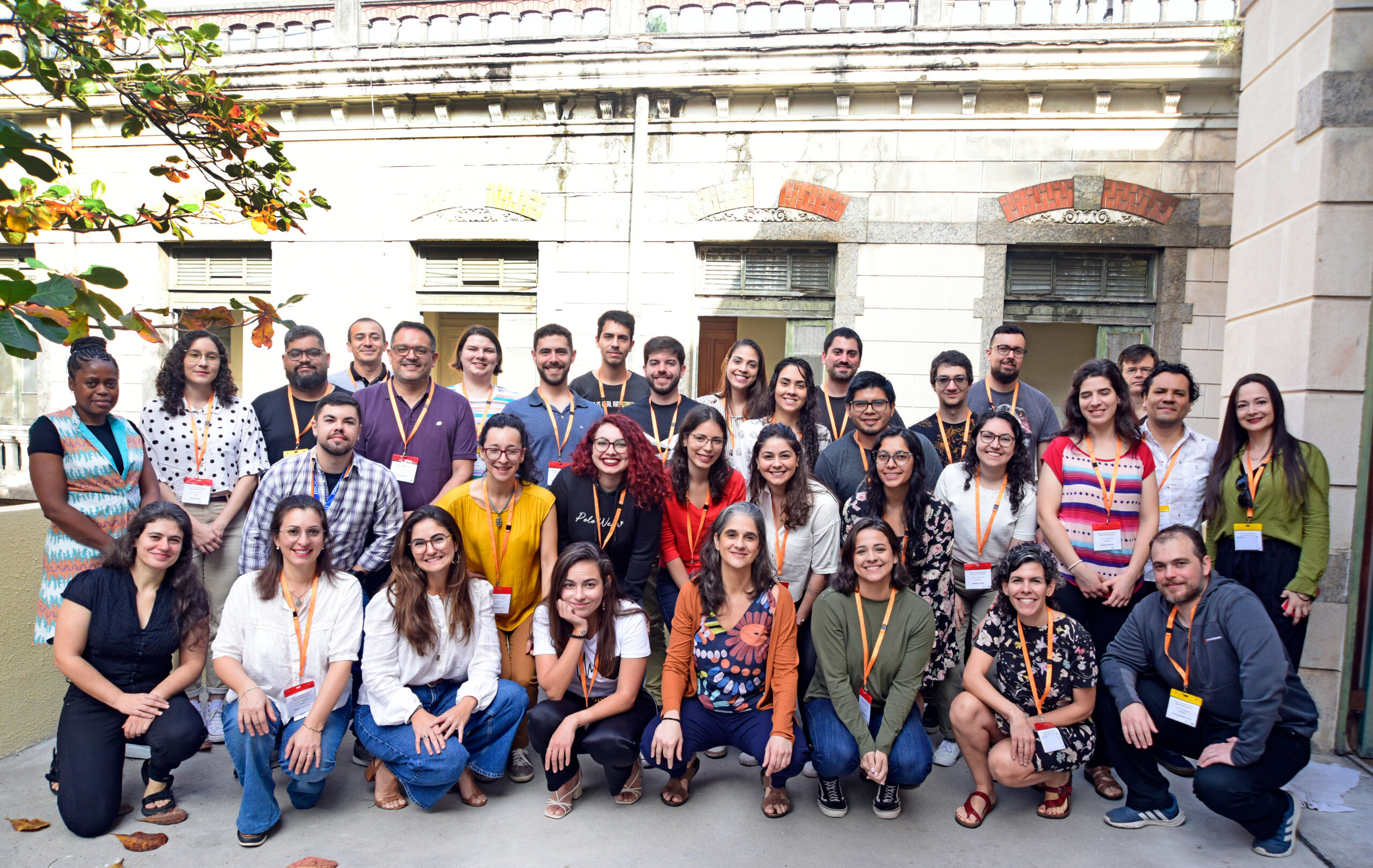
With support from the Chan Zuckerberg Initiative (CZI), we aim to bring members of the 2023 cohort to meet with the 2024 cohort, contributing towards strengthening single cell genomics networks across Latin America.
In June 2024, our seminal Single Cell Biology conference will take place at the Hinxton Hall Conference Centre. Here, thanks to generous funding support from CZI, a number of the 2023 course participants will have the opportunity to attend this conference in the UK, on the prestigious Wellcome Genome Campus.
A focus on emerging tools and technologies:
Embedded at the heart of our programme, is the commitment to enabling fair and inclusive access to knowledge and training on the latest genomics tools and technologies that promise to accelerate discovery science.
In 2024, we are placing particular emphasis on CRISPR technologies and Organoid modelling, as both offer applications across a wide range of biomedical fields.
Working with experts within the Wellcome Sanger Institute, we will deliver courses in both areas to enhance training for scientists new to these techniques and tools.
Alongside these training opportunities are our conferences: CRISPR and Beyond: Perturbations at Scale to Understand Genomes (22-24 April 2024) and Organoids: Advances and Applications (9-11 September 2024). Both provide a platform for scientists using these applications and tools to share their work with peers on a global stage.
Sign up to our newsletter or follow us on social media, to keep in touch with our programme and our Learning and Training team.
